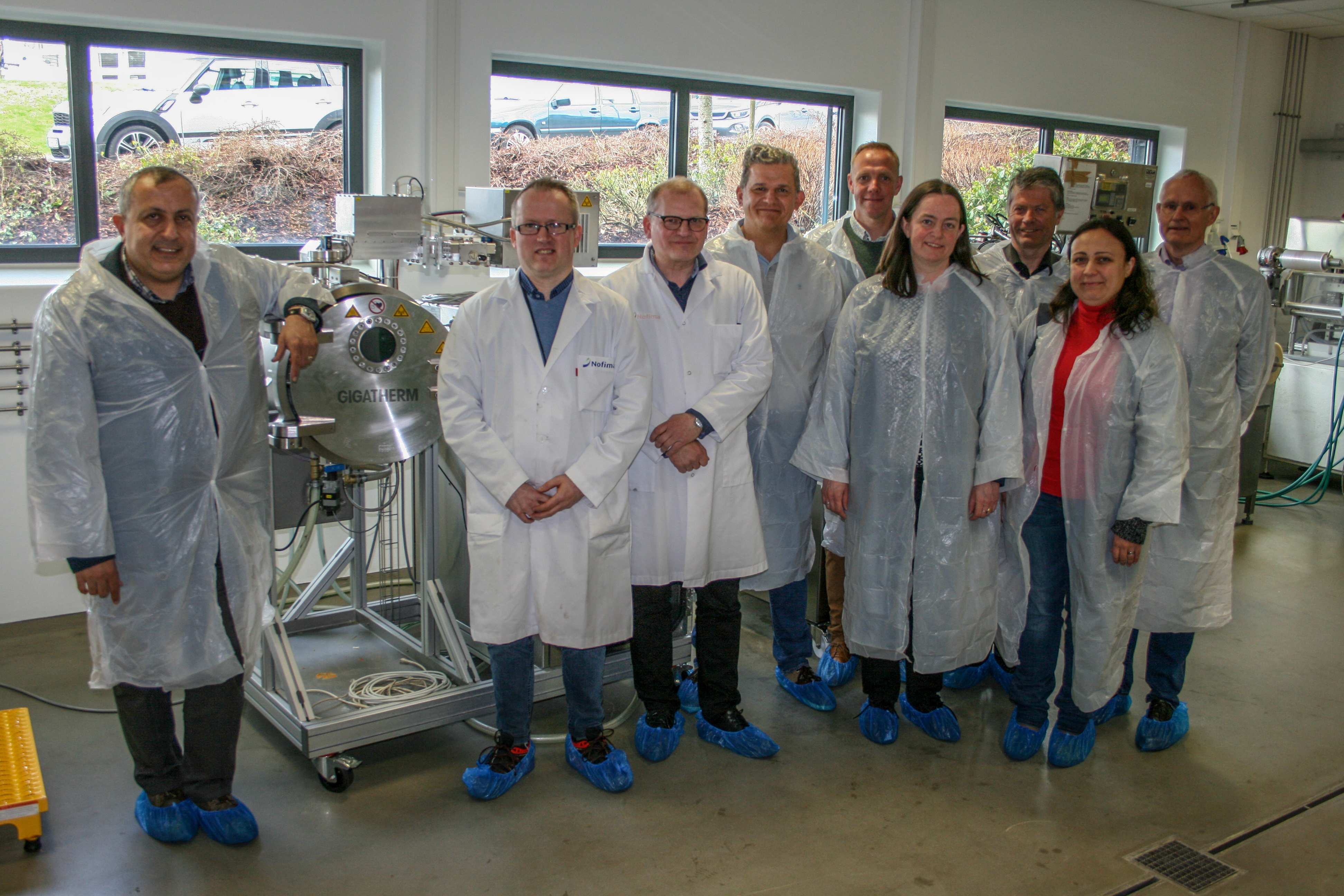How we work

The work in InProVe is divided into six work packages:
WP1 Processing Design and Innovative Technologies
WP4 Product Quality and Safety
WP5 Dissemination and Communication
WP1 Processing Design and Innovative Technologies
The objective is to design and develop innovative processes used in InProVe, in order to contribute to meet selected challenges in food industry with the aim to intensify processes, improve use of food raw materials and improve food quality. More specifically this WP will design, develop, adapt, optimize, implement and confirm the process designs to perform processing of the selected potato and vegetable products and/or by-products.
The primary objective is to form the basis for optimal process design for the innovative technologies by increased understanding of how the process will affect the functions and properties of the treated food and contribute to the desired properties. It also includes prediction of kinetic changes of the food in terms of selected quality parameters, based on achieved time-temperature profiles.
The technologies in question include:
- Tubular Microwave (MW) processing
- MW tunnel processing
- MW batch processing
- Pulsed Electric field (PEF) processing
- Supercritical Fluid Extraction (SFE)
WP-leader: Birgitta Råholt, RISE
WP2 By-product Processing
In a first task, two different strategies will be applied to develop processes to valorise the most important potato and vegetable by-products relevant for the industrial partners in the consortium. The first strategies focuses on the pre-processing and stabilization of by-products to produce food products and ingredients using mild, innovative technologies including:
- Fractionation: Low-O2 milling and pressing
- Enzymatic and PEF pre-treatment
- Stabilization: Dry-On-Water technology
The second strategy focuses on the extraction of valuable compounds to produce food supplements, aroma, colorants, etc. using green extraction technologies such as:
- SFE on PEF pre-treated biomass
PEF pre-treatment of press cakes from e.g. carrot will be evaluated before extraction with the aim to increase the yield. For potato, PEF will be evaluated as a potential way to reduce enzymatic browning, increase the sliceability and increase the yield at extraction of target compounds (starch, fibres, proteins or polyphenols).
WP-leader: Bart van Droogenbroeck, ILVO
WP3 Modelling and Validation
This work package consists of two sections.
In the first, MW heating effects will be simulated and the experimental validation will be carried out in a conventional MW oven and in an industrial scale MW system. The electromagnetic field distribution and the temperature within the product will be simulated to further determine the nutrient changes in the product. Pressure effects for MW processing will also be experimentally planned. To complete the MW simulation, the dielectric value changes as a function of temperature will also be done.
The validation studies will be followed by the nutrient retention analysis to demonstrate the effect of MW processing compared to the conventional case. For the conventional case, the products will be processed in standard cans in a retort, and the simulation studies to determine the temperature distribution and nutrient retention will also be simulated.
WP-leader: Ferruh Erdogdu, Ankara University
WP4 Product Quality and Safety
In this work package we will focus on the quality and safety of fresh and processed vegetables.
Quality, safety and nutritional properties of vegetables are significant parameters for consumer acceptance, and the effects of processing conditions should be known after assuring safety. For this purpose, macro- and micro-nutrient, microbiological and sensory analysis will be performed both on the fresh and processed vegetables. Basic macroscopic parameters such as pH, colour, texture, particle size, viscosity, acidity, moisture content, Brix will be determined. Macro-nutrients protein, fat, carbohydrates (including sugars and dietary fibre) will be analysed. Micro-nutrients vitamins and minerals will be determined. In addition specific bioactive compounds will be measured using LC-MS and HRMS approaches, depending on the matrix (polyphenols, carotenoids, etc.). From a chemical safety point of view heavy metals, mycotoxines and pesticide residues will be monitored. Microbial safety analysis will focus on spoilage and pathogen organisms relevant for the food matrix/product. Finally, sensorial analysis and consumer acceptability will be applied to the final food products.
WP-leaders: Bart van Droogenbroeck, ILVO, and Sema Demir, CRIFFC
WP5 Dissemination and Communication
We will direct communication of results towards two main target groups;
- To the public in general, we will present results concerning the novel technologies’ impacts on the environment, social improvements and consumer related issues, and
- To the potato and vegetable industries we will disseminate results regarding impacts on food production, cost-efficiency, competitiveness and profitability of implementing the novel technologies developed in the project.
The work is conducted according to a detailed communication plan with specific tasks and communication channels (website, social media, newsletters, popular articles in trade journals etc.), to ensure that the results will be available for the target groups and stakeholders.
WP-leader: Lidunn Boge, Nofima
WP6 Management
Communication across the WPs will be conducted in close cooperation between WP-leaders and the coordinator. The coordinator is responsible for taking the necessary actions and alert the EU if necessary. WP-leaders will be given responsibility for a flow of results and progress across the project.
The platform for knowledge-sharing and cooperation throughout the consortium will be established through
- A kick-off meeting for WP-leaders in conjunction with the general project kick-off, aiming to create awareness and ownership to the project
- A digital interactive platform for documentation, knowledge sharing and mutual feed-back. WP-leaders will be held responsible for updating the information to this platform
- Project meetings once a year including all partners, and iv) planned internal communications activities in each WP, managed by WP-leaders.
WP-leader: Trond Løvdal, Nofima


